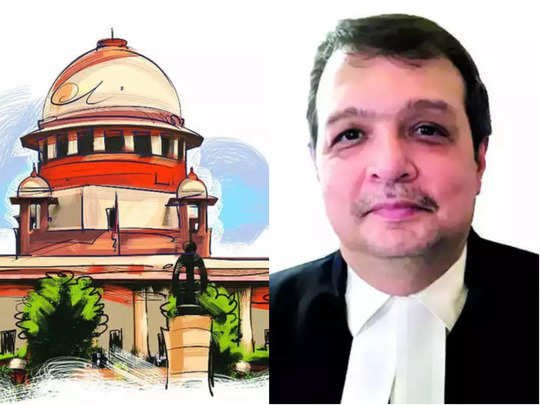Is Constitutional post of Supreme Court judge is not beyond criticism?


The allegiance of the judges of the Constitutional Courts is only and only to the Constitution of India so that the rule of law can be maintained in the country. Emphasizing this point, Justice Jamshed Burjor Pardiwala, the newest judge of the Supreme Court , delivered a clean but bitter speech on Sunday. During his lengthy speech, it appeared that he was responding to his vehement criticism on social media for his excessive comments on Nupur Sharma’s petition. Nupur Sharma had appealed to the Supreme Court to unite the separate cases filed against her across the country in the Prophet controversy. Her appeal was that since she was receiving threats of rape and death, traveling here and there to face the cases would not be free from danger.
Justice Pardiwala said, through his scholarly address on the rule of law and the responsibilities of judges, Justice Pardiwala tried to give the message to the people that ‘the voice of the people is the voice of God’ – this is in a democracy other than elections Can’t work anywhere else. “It is a difficult task to serve the interests of the majority population on the one hand and the rule of law on the other. It requires a very skillful judicial understanding like walking on a rope. What will people say, what will they think – this is a notion that keeps popping up in the mind of every judge while writing judgments on issues of social importance. Then your firm commitment to your responsibility, your loyalty to the constitutional values and your commitment to uphold the rule of law is what motivates the judge to deliver the right justice.
Would anyone agree with Justice Pardiwala’s remarks on Nupur?
Most would also agree with Justice Pardiwala that judges should not be subject to personal attack for their decisions, even if from someone’s point of view the judgment does not meet the legal criteria or is otherwise lacking. But did Pardiwala correct even by telling the alleged blasphemous statement of Nupur Sharma responsible for the brutal murder of Kanhaiya Lal of Udaipur, which the Maulana himself calls a part of the Quran? Should Pardiwala have even made this comment? Was it even necessary to make this comment while giving the verdict? What is certain is that such remarks on the murder of ‘Sir Tan Se Juda’ do not at all enhance the role of judges in upholding the ‘rule of law’. Leaving aside the concept of constitutional courts, the magistrate has a constitutional obligation to protect the right of the accused and ensure fair trial, which is also a constitutional right of the accused.
Comments out of prejudice or out of FIR are not appropriate
One of the highest obligations of the Constitutional Court is not to make comments with prejudice to the accused which are not mentioned in the FIR. And if a judge has made unnecessary observations bypassing this obligation, shouldn’t it be criticized through social media or other means? Does the Constitution forbid the general public from criticizing a Supreme Court or High Court judge for outrightly inappropriate remarks or blatantly wrong decisions?
Know how Justice Pardiwala reached the Supreme Court,
Justice Pardiwala gave such a dreamy concept of an independent judiciary which is completely cut off from the executive. In this context, the appointment of Pardiwala as a Supreme Court judge should be talked about. He was ranked third in the Gujarat High Court and 49th in the seniority order of the judges of the High Courts across the country. Suddenly his name was discussed in the Supreme Court Collegium and it was announced on 5th May.
The rule of law and the practice of appointing judges to the Supreme Court dictate that the names of judges senior to Pardiwala should have been considered earlier. But Pardiwala was brought to the Supreme Court bypassing the qualifications of several judges who were five to eight years senior to him. Imagine, if the petition of a government official had come before Justice Pardiwala, in which he had complained against the promotion of eight years junior to him, what decision would he have given? The rule of law cannot be just a matter of speech. It must have nerves of steel and a brilliant mind in its DNA.
Where has the rule of law gone then?
Another amazing thing happened with the appointment of Justice Pardiwala as a Supreme Court judge. The Chief Justice of the Supreme Court keeps accusing the government of hanging on to the recommendations of the collegium for a long time, but what is surprising is that the government gave the green signal to Pardiwala’s appointment within three days. He took the oath of office on 9 May. Will anyone be able to explain to the general public that when the posts of judges in the High Courts are vacant for years due to Kovid, then what is the secret behind Pardiwala’s appointment in the Supreme Court at supersonic speed?
People’s voice doesn’t matter here. Where does the general public have the right to question the appointment of judges? They should not even get this right, but they should be assured that the rule of law, convention and tradition will not be ignored while making quick appointment of a judge to the Supreme Court. Whether the executive exerts pressure on the Supreme Court collegium, the question keeps arising in the corridors of the Supreme Court of the country.
DISCLAIMER: The author is solely responsible for the views expressed in this article. The author carries the responsibility for citing and/or licensing of images utilized within the text.
